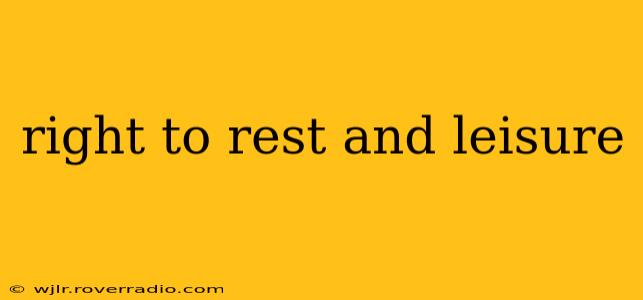The right to rest and leisure is a fundamental human right, recognized internationally as crucial for individual well-being and societal progress. This right isn't merely about relaxation; it's about the opportunity for rejuvenation, personal growth, and participation in community life. This comprehensive guide explores the nuances of this vital right, examining its legal basis, societal impact, and practical implications.
What is the Right to Rest and Leisure?
The right to rest and leisure is enshrined in several international human rights instruments, most notably Article 24 of the Universal Declaration of Human Rights (UDHR) and Article 7 of the International Covenant on Economic, Social and Cultural Rights (ICESCR). These documents stipulate the right to rest and leisure, including reasonable limitations of working hours and periodic holidays with pay. This isn't simply about avoiding work; it's about ensuring individuals have the time and opportunity to engage in activities that promote their physical, mental, and social well-being. This includes everything from pursuing hobbies and spending time with loved ones to engaging in political and social activities.
What are Reasonable Limitations of Working Hours?
This question delves into the specifics of work regulations and their impact on the right to rest and leisure. Reasonable limitations on working hours aren't arbitrarily defined. They vary depending on factors like the nature of the work, the health and safety of workers, and national or regional laws. Generally, this includes legal mandates for maximum working hours per day and week, paid overtime for exceeding those limits, and provisions for rest breaks during the workday. The International Labour Organization (ILO) plays a vital role in setting international labor standards and promoting the observance of reasonable working hours. Failure to adhere to these standards can lead to worker exploitation and negatively impact their overall well-being.
How Does the Right to Rest and Leisure Impact Society?
The societal benefits of ensuring the right to rest and leisure are substantial. When individuals have adequate time for rest and leisure, they are better equipped to:
- Contribute to the economy: Well-rested and rejuvenated individuals are more productive and creative in their work.
- Engage in civic participation: They have the time and energy to participate in community activities, contributing to a vibrant and engaged society.
- Improve their mental and physical health: Leisure activities contribute to stress reduction and overall well-being, reducing healthcare costs and increasing life expectancy.
- Strengthen family and social bonds: Dedicated time for rest and leisure allows for nurturing relationships with family and friends, fostering stronger communities.
What are Periodic Holidays with Pay?
This question focuses on the importance of paid time off as a component of the right to rest and leisure. Periodic holidays with pay are a crucial aspect of this right. They provide workers with the opportunity to take time off for rest, relaxation, and personal pursuits without facing financial hardship. The duration and frequency of paid holidays vary across countries and often depend on collective bargaining agreements and national legislation. This paid time off is not merely a benefit; it's a fundamental right that empowers individuals to maintain their well-being and prevent burnout. Access to paid holidays is particularly critical for vulnerable workers and contributes to a more equitable distribution of time for rest and leisure.
How is the Right to Rest and Leisure Protected?
The right to rest and leisure is protected through a combination of international law, national legislation, and collective bargaining agreements. However, the implementation and enforcement of this right vary significantly across different countries and contexts. Challenges include:
- Lack of enforcement: Even when laws exist, their enforcement can be weak, allowing for exploitation of workers.
- Economic disparities: The right to rest and leisure is often disproportionately impacted by economic inequalities, with low-income workers facing greater challenges accessing adequate rest and leisure.
- Cultural norms: Cultural norms that prioritize work over rest can undermine the effectiveness of legal protections.
Advocacy groups, labor unions, and international organizations play a crucial role in promoting and protecting this right through education, awareness campaigns, and legal action.
Conclusion: The Importance of Prioritizing Rest and Leisure
The right to rest and leisure is not a luxury; it is a fundamental human right essential for individual well-being and societal progress. Ensuring access to adequate rest and leisure requires a concerted effort from governments, employers, and individuals. Protecting this right contributes to a more just, equitable, and sustainable world for all. The ongoing work to fully realize this right remains crucial for achieving a society where every individual has the opportunity to experience the benefits of rest, relaxation, and meaningful engagement in life beyond work.
